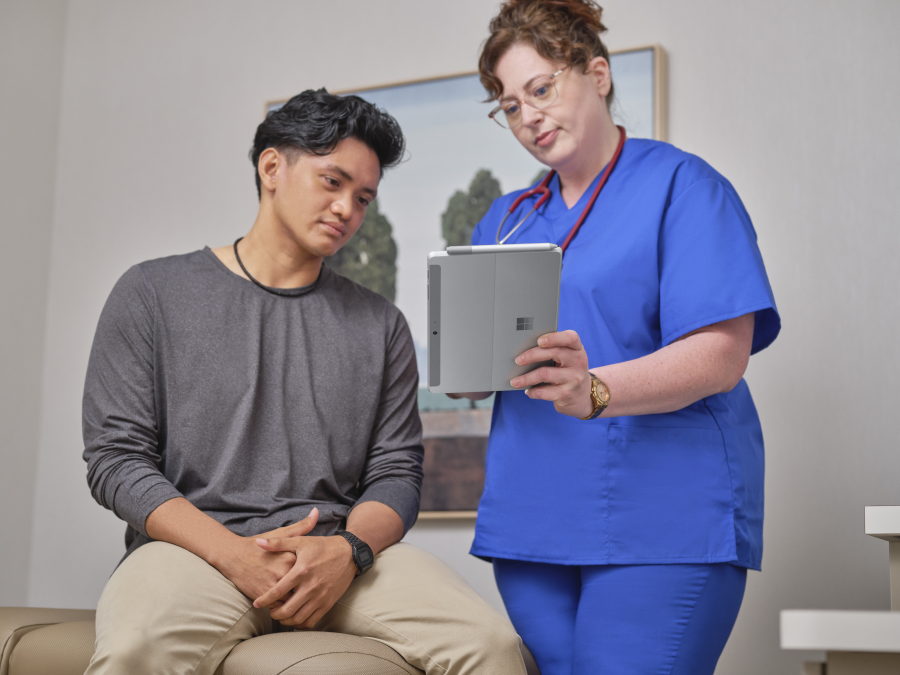Notizie per Categorie
Articoli Recenti
- Enhancing healthcare productivity and security with Windows Cloud solutions 3 Aprile 2025
- Enhancing healthcare productivity and security with Windows Cloud solutions 3 Aprile 2025
- Enhancing healthcare productivity and security with Windows Cloud solutions 3 Aprile 2025
- Threat actors leverage tax season to deploy tax-themed phishing campaigns 3 Aprile 2025
- Threat actors leverage tax season to deploy tax-themed phishing campaigns 3 Aprile 2025
- Threat actors leverage tax season to deploy tax-themed phishing campaigns 3 Aprile 2025
- Shaping the future of product engineering and research and development with generative AI 3 Aprile 2025
- Shaping the future of product engineering and research and development with generative AI 3 Aprile 2025
- Shaping the future of product engineering and research and development with generative AI 3 Aprile 2025
- [In preview] Public Preview: Increased VNet limits for Private Endpoints 3 Aprile 2025
Microsoft Cloud for Healthcare: Empowering healthcare to deliver meaningful outcomes

Healthcare organizations continue to face complex challenges of evolving patient expectations, talent shortages, workforce burnout, and financial operational insecurity. But you’re not facing these challenges alone. Innovators across industry, partners, and technology are joining forces and collaborating to find answers. We’re eager to join you at HIMSS23 and demonstrate how technology can play a role to solve these challenges and help your organization gain value faster with more confidence into the foreseeable future.
In our latest feature release for Microsoft Cloud for Healthcare, we’re excited to share how we can help your organization deliver exceptional patient and member experiences, accelerate data-driven decision-making, support your healthcare workforce, and enhance collaboration across the care continuum.
New Microsoft Cloud for Healthcare features accelerate transformation for health payors
We continue to help our customers and partners maximize the value of their investment in Microsoft Cloud technologies with industry specific apps, connectors, workflows, data, and AI models. With today’s announcement, and building on our October 2022 release, we’re accelerating value of the Microsoft Cloud and expanding our investment across a new vertical for health payors and insurers, which will complement the existing capabilities for healthcare providers:
- Unified member view for payors (preview). Helps organizations foster deeper member relationships by delivering useful member data to help relationship managers with a deeper understanding of a member’s wellness goals, important life moments, and other personal attributes. This application provides a comprehensive view of member data and member insights in one place for payor organizations. It builds upon the Microsoft Cloud for Healthcare Payor data model, previewed in 2022, and combines member information about claims, coverage, risk profile, care plans, and more. Customers can utilize this feature within existing Microsoft Dynamics 365 Customer Insights instances or utilize Microsoft Power Platform for building new member profile templates.
- Care journey templates for care management outreach (preview). Now payors and providers can automate workflows with common scenario templates (for example, patient discharge, care plan off track, diabetes management, and more) for Microsoft Dynamics 365 Marketing that can be used out of the box or customized for care management scenarios and help improve the quality of the care journey for patients and members. Providers and payors can send messages through Microsoft Teams, surface to-dos in the patient interaction timeline, and allow for secure messaging through Patient Access Portal. The patient journey feature extends communication channels beyond email to include text messaging and push notifications.
- Device data support for remote care management (preview). Built within Microsoft Power Platform, this feature enables healthcare organizations to support better hybrid care services, resulting in fewer patient visits to clinics and more frequent insights into patients’ health. This feature allows care teams and care managers to remotely monitor their patients’ vital health data, identify trends with that data, and manage their inventory of assigned medical devices. This feature builds upon the capabilities of MedTech service in Azure Health Data Services as well that of our independent software vendor (ISV) partner, Life365, that has integration to more than 400 original equipment manufacturer (OEM) devices.
- Enhanced operations support for Virtual Health Data Tables (general availability). We have further enhanced the Virtual Health Data Tables functionality to include support for creating and updating, as well as deleting Fast Healthcare Interoperability Resources (FHIR) data. This feature now allows users of Microsoft Power Platform based applications, built leveraging Microsoft Cloud for Healthcare Common Data Model and Virtual Health Data Tables, to also trigger real-time updates of clinical data stored in FHIR servers like Azure Health Data Services without the need for duplicating that data in Dataverse.
We recently announced our expanded collaboration with Cognizant and the plans to integrate Cognizant’s TriZetto healthcare products with the Microsoft Cloud for Healthcare. Through this integration we will be able to help support our mutual clients, deliver enhanced patient and member engagement, have access to improved data interoperability, improve insights, and achieve operational efficiencies in a significantly shorter time-to-value. Our companies will also collaborate to develop and run Cognizant’s current and future healthcare software as a service (SaaS) solution on Microsoft Azure, migrate new and existing clients from on premises environments to streamlined functions managed on the Microsoft Cloud, and support future technologies designed to deliver new insights for payers, providers, and consumers.
Seize the full potential of AI, while safeguarding your business, your data, and your health workforce
At Microsoft, we believe that AI is the defining technology of our time. Our company has been at the forefront of cutting-edge AI research and continually integrates powerful, innovative AI technologies into our products and services to help customers do more. We also recognize that data is the fuel that powers AI technology, and peak performance requires clean, integrated, accessible data. We continue to make huge investments in data and AI research, technologies, and partners because we’re committed to bringing technology and people together to realize the promises of AI responsibly.
Our momentum continues with updates across our Azure AI Services for Health:
- Text analytics for health released social determinants of health (SDoH) and ethnicity support (preview). Enables unlocking mentions of social, environmental, and demographics factors from unstructured biomedical data including assertion detection such as negation of substance uses. Moreover, timing, frequency and amounts mentioned in the context of SDoH will be captured and associated with the entities using semantic relations that will now be surfaced as well. Healthcare organizations, providers, researchers, and pharmaceutical companies can extract insights, improve care, assess health inequity issues, track health outcomes, as well as incorporate underrepresented groups into clinical trials and research, breaking cycles of disparity.
- Project Health Insights (preview). New Azure applied AI service that provides pre-built models which perform a decision support conclusion that can help health organizations solve high-value productivity challenges for clinical trial matching, and OncoPhenotypes. Project Health Insights models will enable healthcare providers to rapidly identify key cancer attributes within their patient populations based on their tumor site, tumor histology, and cancer staging. The models also matches patients to potentially suitable clinical trials, according to the trial’s eligibility criteria and patient data helping find clinical trials, that patients could be qualified for, as well as finding a cohort of potentially eligible patients to a list of clinical trials.
- Azure Health Bot integration with Azure OpenAI Service (preview). We are releasing a new Azure Health Bot template that allows our customers to experiment with the integration of Azure OpenAI Service into their Health Bot instances for fallback answers. This feature does not aim to facilitate the bot to answer unknown queries in the medical space, rather, it enables customers to access the Azure OpenAI Service API and decide how to use the model to improve their bot built through the Azure Health Bot service. Currently, we are offering the preview for internal testing and evaluation purposes only.
Today, we are also excited to announce the general availability of the accelerator kit for healthcare as part of the Responsible AI Dashboard in Azure Machine Learning. The Responsible AI Dashboard is applicable across industries; the accelerator kit for healthcare is aimed at training and debugging models for fairness, explainability, biases, and more before they are implemented in healthcare settings. The Responsible AI Dashboard accelerator kit for healthcare is a valuable tool to help check models for fairness prior to model adoption, allowing for confidence to use AI to inform space planning in hospitals or dispatching medical staff in facilities.
This embed requires accepting cookies from the embed’s site to view the embed. Activate the link to accept cookies and view the embedded content.
In addition to model debugging, the Responsible AI Dashboard accelerator kit for healthcare in Azure Machine Learning can equip healthcare providers with directional and causal relationship analyses between historical patient data and health scores to better provide lifestyle recommendations and modifications for patients.
Foster better collaboration and empower your healthcare workforce
Today, global health systems and payors are turning to collaborative technology platformsintended to reduce administrative burden and proactively share data for interventionsto drive much-needed change. Technology should offer better ways of working, evolving the parts of healthcare delivery that are working and eliminating those that aren’t.
In our booth at HIMSS 2023, attendees can experience the power of Microsoft Teams to simplify care coordination to help reduce clinician burnout, streamline communication and data sharing, facilitate multidisciplinary collaboration, and improve the patient-care team relationshipwithout compromising data security and compliance or adding unnecessary friction.
Virtual care tools reduce constraints on what clinical teams can accomplish and enable new and different ways to work. By leveraging virtual care, you remove barriers that hinder traditional care delivery models and empower people to create new solutions that are far more flexible, efficient, and supportive. Virtual Appointments in Microsoft Teams provides an out-of-the-box solution for clinicians to make patient-care team interactions as easy andpersonalized as possible, now generally available. Built on top of scheduling solutions like bookings or integrated with your scheduling solution through application programming interfaces (APIs), Virtual Appointments enable care teams to serve their patients in new and innovative ways. And with Teams Premium, healthcare organizations get advanced Virtual Appointments to manage the end-to-end appointment experience with capabilities like text messaging, custom-branded waiting rooms, analytics, and more.
For healthcare organizations using Epic or Oracle Cerner, the Microsoft Teams EHR connector enables care teams to schedule and launch Teams virtual visits directly from their electronic health record (EHR) system. The connector gives patients flexibility with the option to join virtual visits via browser, the Teams app, patient provider portals, or text messaging, and offers support for group visits. Microsoft Teams with Teladoc Health Solo’s medical-grade whole-person virtual care delivery solutions for hospitals and health systems helps to optimize clinical efficiency, improve patient satisfaction, reduce burnout, and increase profitability, all while supporting an organization’s telehealth goals for today and tomorrow.
Health that connects and tech that cares at HIMSS 2023
We’re excited to join other innovators at the HIMSS 2023 conference to showcase how customers’ need for flexibility, choice, and future innovation doesn’t have to mean more complexity, people, and cost. For those of you traveling to Chicago for HIMSS 2023, I look forward to seeing you there. And I look forward to showcasing our latest Microsoft Cloud for Healthcare capabilities and more.
Here are additional ways you can learn more about Microsoft updates:
- Explore our demos and visit our in-booth Learning Center at HIMSS 2023 booth #1201
- Learn more about Microsoft Cloud for Healthcare
- Try out a free limited trial of Microsoft Cloud for Healthcare
Transform the healthcare journey
Deliver better experiences, insights, and care with Microsoft Cloud for Healthcare.

- Epic is a registered trademark of Epic Systems Corporation.
- For Oracle Cerner customers, the EHR Connector is only available in the United States.
The post Microsoft Cloud for Healthcare: Empowering healthcare to deliver meaningful outcomes appeared first on Microsoft Industry Blogs.
Source: Microsoft Industry Blog
